danbricklin.com/log
|
||
|
|
Starting September 7, 2005
Podcast with Robin Miller of OSTG, MA Senate hearing on the ITD Open Document decision, Cheapflights has a corporate blog, Berkman Center meeting on Open Document Format, MITX Fireside Chat with J.J. and Jeremy Allaire, Kudos to Doonesbury, Learning from podcasting for recording family memories, Happy 80th Dad!, A bit more about the open formats meeting, Recording of meeting with MA officials about open formats, Podcast with Toby Redshaw of Motorola and FIOS update, Podcast with Nokia EVP Anssi Vanjoki
07Sep05-01Nov05
2005_09_07.htm
|
|
|
Podcast with Robin Miller of OSTG [link]
I spent some of today at the Open Source Business Conference which is being held on the other side of my town, Newton, Massachusetts. After a panel on "Building a Strong Software Business on Open Source" (pictures below), I ran into Robin Miller. Robin is editor-in-chief at the Open Source Technology Group, which includes Slashdot.org, Linux.com, SourceForge.net, etc. We talked for an hour or so. At one point I realized I should share this and we went outside into the night air and did a 12 minute podcast. You can find a link to it on my podcast HTML page. The mike cable was screwed onto an adapter too loosely (I have new equipment I'm still learning), so it has some clicks and drop outs at the beginning, and the wind was blowing a bit, but for my first impromptu handheld podcast I'm pretty pleased.
   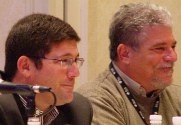  Zack Urlocker (MySQL), Stephen Walli (Optaros), Kim Polese (SpikeSource), Doug Levin (Black Duck Software), Larry Rosen (Rosenlaw & Einschlag), John Powell (Alfresco)
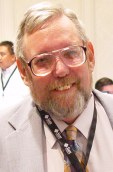 Robin Miller wearing a tie
MA Senate hearing on the ITD Open Document decision [link]
This afternoon I attended the Massachusetts Senate Post Audit Committee hearing about the ITD decision to standardize on the Open Document Format (ODF). I was able to make an audio recording which I post here. It is in three parts, running a total of almost three and a half hours. There is a detailed write-up (almost a real-time transcript) by Andy Updegrove on his Standards Blog. Only invited speakers presented. They included from the ITD office, other parts of the State government, and people representing people with disabilities.
The first eight minutes of the first recording is somewhat poorer than the rest of the recording (and has some mike handling noise). After that the recorder was moved to be closer to the people speaking. The only post-processing done was to change the audio characteristics in an attempt to improve the sound. At various times throughout the recording you can hear a very loud air conditioning system running. The MP3 audio files run 1:57:47, 20:16, and 1:01:34 in length (54MB, 9MB, and 28MB). You can find links to them on my blog podcast HTML page.
At about 1:01:00-1:05:00 in the first recording, the senator running the hearing, Senator Pacheco, makes a statement about Open Office and the effect of the GPL which puzzled some people. I spoke with him at length after the meeting. This is what I interpret him to be saying (in my words): As should be clear from the meeting, especially as you listen to the end, he is very concerned about process being followed and the state of things now or at the time the decision went into effect last month, not in the future (even next month). It seems that the point of the hearing was to see if a different process needed to be followed that might take longer, even if the result is the same. He is a keeper of process to protect the citizen. As he sees it from what he was told by various parties (pro- and anti-ODF), today (October 31, 2005), the best (basically only) available ODF-supporting product is Open Office. If you want to build something today upon an ODF-supporting product (which he sees as only Open Office, which is released under the GPL) you would run into the reciprocal nature of the GPL on what you build. (With something built in the future to support ODF on a different base than Open Office, where it doesn't have to be under GPL, you wouldn't have this problem. But that's not today.) I think that was what he was trying to say. He told me that he heard this thing about proprietary companies having to release their code under GPL in this situation from some parties in the ODF-friendly camp, too. However, he'll wait for the Auditor's department to tell him the real situation. (PJ of Groklaw points out that Open Office is licensed under the LGPL, not GPL, so it may be even less of a problem than the senator was led to believe.)
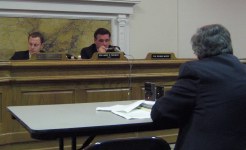 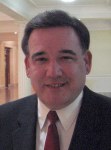 The hearing, and Senator Pacheco in the hall afterwards
As I remember hearing it, Senator Pacheco's stated goals are to follow proper governmental process, save money (as determined by the auditors), support people with disabilities, have competition, and other good things (viewed as a citizen).
In any event, as I see it, the Senator and his department have a hard time (given their wide range of items to deal with and limited staff) interacting with a large number of individuals contacting them on this topic one by one. If you want to react to this and provide feedback, it is best, if you want to have an effect, to bundle up the reactions and present them through an organization, large company, or some other representative whose goals and biases they can understand and factor in. He says that he likes this process to be open and visible to the public. I hope these recordings help do that, and that the process continues to be visible to the public. I thank the Senator and the committee for holding this in public.
Cheapflights has a corporate blog [link]
Corporate blogs seem to be an important topic now. How do corporations make use of blogs and work them into their business? Here's a new example.
For the last couple of years, I've been on the board of the US subsidiary of Cheapflights. Who are they? Cheapflights is a major travel website in the UK and the US version has been growing quite nicely, too. They list inexpensive flights with links to the sellers and make their money off of referral fees. Good information is key to them -- if they only listed non-cheap flights, no one would visit them. They also have a very popular email newsletter. Many travel deals are only available through "consolidators" who work with airlines to buy up excess capacity, blocks of tickets, etc. That's how many travel agents and corporate travel departments can get great deals on certain city pairs on short notice. These deals are not on regular websites (some are only available by phone -- the specialist for a particular city pair may run her business out of her attic but has a great deal if you happen to be flying from, say, Boston to Sidney). Cheapflights has relationships with these businesses as well as many airlines, etc.
As you can imagine, ever since I started working with them I've been pushing them to have a blog. With all the constant changes in air travel, and their inside information, it is a natural. Also, they depend upon search results to get viewers, and blogs are a great way to get search engine love. Every time I asked when they'd have a blog they said "Wait, we're working on it."
Finally, this morning I got an email telling me that they have a beta version live. They started working with an established blogger in the area, assigned additional real staff to the project, and took it very seriously. When I looked at the site I was quite blown away. They didn't do the simple "toe in the water" simple daily blog that I had expected. They did a full system with lots of categories, comments, many daily posts, lots of detail, interviews, and more. The comments are moderated, but they like my suggestion of giving the "OK" person a Blackberry or equivalent to make those OK's fast. (I think moderated comments for such a corporate blog are a fine start in today's spam-filled world as long as they do a good independent job of moderating.)
Take a look. It's at news.cheapflights.com. This is beta. They'd love feedback and will be responsive to it (send it to them, only CC me if you think I need to know -- this is not my project). They are learning and are not the type of people who think only they know what this should be. Right now most of the material is very matter of fact, but they tell me (I asked) that they do want to make it more personal with a "voice" in places, too. The organization (with lots of categories) lends itself to mixing fact and discussion.
You can see how this addition can change the character of what they are providing to the travel industry and can be an important part of their business of providing information to interested travelers. I look forward to seeing how this evolves as a corporate blog that is an integral part of the business.
Berkman Center meeting on Open Document Format [link]
There was an invitation-only meeting at the Berkman Center this afternoon. I attended and managed to get a good recording of the first hour and a quarter (of two hours) before my batteries died. They will have a full recording shortly on their website, so if you want to hear it all at once, wait, or if you like the beginning, finish off with them. The part I missed was quite good. You can find a link to my MP3 on my podcast feed page.
The moderator was John Palfrey (Berkman Executive Director), with panelists Steve Bratt (COO W3C), Tim Bray (Sun), Doug Levin (CEO Black Duck Software), and Bob Sutor (VP Standards and Open Source, IBM).
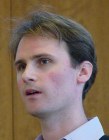 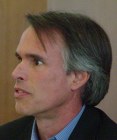  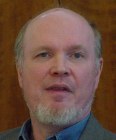  Palfrey, Bratt, Levin, Bray, and Sutor
Here's the announcement:
The Berkman Center for Internet & Society, in partnership with IBM, invites you to an interactive discussion of open standards on the afternoon of Thursday, October 27th. The purpose of this meeting is to explore together how open standards are increasing productivity, decreasing costs and shifting control of information and technology choice from vendors to individuals, businesses and governments. The session will be held on the Harvard Law School Campus in Harkness Commons in Cambridge, MA from 2:30 p.m. until 4:30 p.m.
One focus of our session will be on OpenDocument Format (ODF), a new OASIS open standard which enables greater flexibility, technology options, interoperability, and enhanced capability to communicate with and serve customers. The value of this standard was made evident by its importance to the thirteen nations whose input helped us to produce The Roadmap for Open ICT Ecosystems. In addition to the Commonwealth of Massachusetts' recent adoption of ODF, nations from across the globe are emphasizing the importance interoperability as a policy matter and pointing to ODF as an enabler of collaborations among industries, people and governments. (See http://cyber.law.harvard.edu/epolicy for a more information and a copy of the report).
MITX Fireside Chat with J.J. and Jeremy Allaire [link]
I went to a MITX Fireside Chat tonight. The interviewer was Ted Schadler of Forrester. The interviewees were J.J. Allaire and Jeremy Allaire, founders of Allaire Corp., the ColdFusion people. Rather than write it up, I recorded it and you can listen to the whole thing as a podcast. The recording was done with a single mike a few feet away from the three participants and posted directly without processing (sorry for the heating system noise in the background). It's 1:00:53 in length (28MB).
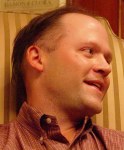   J.J. Allaire, Ted Schadler, Jeremy Allaire
I've started a "Dan Bricklin's Log Podcast" feed for recordings that don't fit in other specific series. I've added links to an HTML page with the list of shows and the podcast RSS feed to the top of my main blog page. Hopefully this will let me get some content out more frequently without needing to spend the hours it takes me to write up a meeting in text for this blog.
Kudos to Doonesbury [link]
A major problem in the United States is the drop in the number of students studying engineering in college. Reportedly, we are graduating fewer engineers than we used to and are falling far behind other countries, such as China and Russia. This was one of the issues Ray Kurzweil and I discussed with Mikhail Gorbachev last April, including how encouragement from leadership is important to increasing enrollment.
With this background, I was very pleased this morning to see Gary Trudeau take up the issue in his latest Doonesbury comic. Mike Doonesbury's daughter Alex is applying to college, and her list includes a variety of engineering schools, like MIT. Today's comic included the following dialog: "J.J. [Alex's mother, a performance artist]: And you're also considering R.I.T.? Alex, I know you've been bitten by the science bug, but isn't this list a bit geek-heavy? I mean, how do you know this engineering thing isn't just a phase? Alex: Mom, I hold five patents." I hope this story line continues with Alex going to an engineering program and with a positive spin, satirizing those that belittle such endeavors.
By the way, I'm sorry that I haven't had much time to blog recently. I'm hard at work on a new product (which I'll hopefully release in alpha in a few weeks) and some speaking gigs, consulting, family events, and Jewish holidays have taken up the rest of my time.
Learning from podcasting for recording family memories [link]
Last night we had an 80th birthday party for my father. My sister and brother flew in, his slightly older sister (my aunt) was in visiting my cousins, and they and a few close friends and relatives from Massachusetts that he'd easily remember joined us at my mother's apartment for a nice party.
The night before some of us had dinner at my mother's. After dinner we watched a few old videos. One in particular was from my aunt's 60th birthday over 20 years ago. Her son had set up a home video camera in a bedroom and brought people up in little groups or as couples. He'd ask them to give some remembrances of my aunt. Most were not at all used to talking on camera, so only a few had really interesting things to say, but those were real gems. Watching them talk to my cousin behind the camera and to each other was also fun.
While watching it, my cousin and I remarked to each other how striking it was to see the old relatives and family friends, many no longer alive, as the interesting vibrant people they were. It was like looking through a wormhole to the past. She said we really needed to do this ourselves to help save memories. I was planning to videotape my father's party anyway, so we decided to add some time to reminisce and tape that. I knew my Dad would like hearing us sharing memories about him.
I decided that the best way to do things was to have us all sit around and tell stories to each other. The people on the tape we had watched were alone in a room facing a camera. It was hard to be spontaneous and think of something. When you are in a group you have some give and take as what one person says triggers a memory in another. Talking to real people is much better than a camera in many ways.
I had one worry. The sound on home video recordings in a big group is often quite bad. You hear everything, often making the person speaking who is across the room hard to understand. The auto-gain control helps you hear the people, but it also amplifies clinking glasses, coughs, etc., and the wood floors and big room make for lots of echoes. What should I do?
My podcasting background and avocation came to the rescue! As I've written before, I found at the Open Source SIG meeting and the Open Formats meeting that having a handheld wireless mike works really well. It acts as a "token" to be passed to limit somewhat who is talking -- the person with the mike has the floor, so to speak. The directional aspect of most such mikes emphasizes the sound of the one speaker and cuts out other sounds. I've had lots of compliments on the sound quality of those recordings.
It just so happens that last Friday I received the wireless handheld mike that I ordered for podcasting. For the two meeting podcasts that I did I was lucky that someone else picked up the tab for a sound person and equipment, but that cost hundreds of dollars each time. I decided to bite the bullet and get one of my own so if necessary I can do it myself along with my other podcasting equipment. After trying a less expensive one, I ended up with a Shure PGX4 with the SM58 wireless handheld (sounds pretty good, rugged enough, but has a little hiss). I also got a special adapter with it to convert the XLR output to an 1/8" plug and impedance. I tested it and it worked pretty well plugged into my home video camera. (Given the low light and trying to be less imposing, especially when walking around, I decided to use a sensitive home unit rather than my fancy DVCAM camera that I used for my Developer's Introduction to Copyright video). The sound level out of the mike was a little loud if you held the mike up to your mouth like a singer (next time I'll use a little external volume control I have), but if I got people to hold it down in their laps a foot away from their mouths it sounded really good. (I did not set up any speakers -- only I could hear the mike through earphones connected to the video camera.)
The party was wonderful. My Dad had a really great time as did everybody else. The storytelling went really well. All sorts of stories came out in the hour I recorded. The sound worked out really well, too. The video sounds more like something on TV and less like a few radios playing in a reverberating bathroom. I hope years from now we and the generations after us will find this an improvement and get to know us as we are now better. As I write this I'm duplicating DVD copies of the video to give to the various families that attended.
Happy 80th Dad! [link]
Today we celebrate the 80th birthday of my father, Baruch Bricklin. As I wrote on this day five years ago, my father has been very important to me in my life, both as a teacher of skills that have helped me in my technical and business endeavors and as a role model for being a good person. His brain injury, a result of a car accident 15 years ago, continues to impair him quite severely, but his strength, drive, and innate intelligence continue to sustain him and are an inspiration to all who know him.
As a gift, I created a photo album from my collection of digital pictures to go with the other albums he looks at. As I've written before, in addition to recording images from my current life, I try to take digital photos of any paper prints (and other artifacts) I run into at family reunions, people's houses, on their walls, etc. This let me add to the album many much older images, spanning much of his life, showing him himself and his loved ones. Here are three:
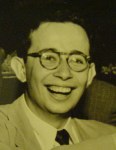 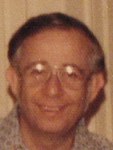 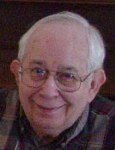 My father, Baruch Bricklin, in his 20's, late 40's, and late 70's
Happy 80th Dad! I love you very much!
A bit more about the open formats meeting [link]
I forgot to include some pictures:
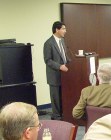 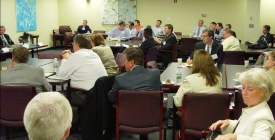 Eric Kriss giving his opening remarks, many of the attendees
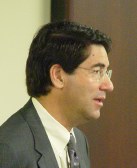 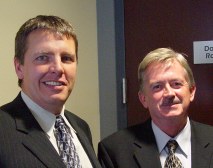 There is more about the meeting in articles by Tim Bray of Sun, David Berlind of ZDNet, and on Groklaw.
Recording of meeting with MA officials about open formats [link]
The Mass Software Council has combined with another organization, the New England Business and Technology Association, to create the Mass Technology Leadership Council. Last Friday the Council held a meeting with Massachusetts state officials and representatives of the software industry. There have been many reports in the business and technology press and blogs about how Massachusetts is endorsing the Open Document 1.0 file format and not the Microsoft Office formats. This meeting was to provide feedback about that decision. Attendees included representatives from Microsoft, Adobe, Sun, IBM, and other companies. I led the meeting and arranged to have it recorded. The recording (over 50MB in size, lasting almost 2 hours) is now available. If you want to download a copy to listen, see "Open Format Meeting September 2005" on the OSS SIG wiki.
Podcast with Toby Redshaw of Motorola and FIOS update [link]
Last night we posted another DiamondCluster Wavelengths podcast. This one was with Toby Redshaw, Motorola corporate vice president, Corporate IT Strategy, Architecture and e-Business. Before Motorola he spent 17 years at Federal Express where he held several senior IT and business positions. Toby clearly knows his big company IT.
He talked about cell phones from an IT perspective. He talked about how they fit in with Motorola's internal IT environment, where innovation is coming from, Motorola's experience with Service Oriented Architecture (SOA) for IT and what they've learned, seamless mobility, and more.
Here are some points: They are working on "seamlessly mobile set of solutions...that allows you to move between networks...regardless of whether you are in your home, you're in your office, you're out on the carrier network, or you're in your car." [4:50]. With regards to SOA, two surprises: The conversation changes between the technical people and the people who want solutions to be about process flows, and that conversation is aided by "fastest, best prototyping you've ever seen" [15:00]; you've got to be very disciplined about the infrastructure that SOA lives on (security, directory, common simple interface) [16:30]. He feels that peer-to-peer is coming, but not on the doorstep yet, but "it's absolutely the logical extension of a world that has a sea of devices, a sea of appliances, and a sea of sensor-nets -- it is just mathematically difficult to understand the throughput of systems like that being completely managed through central checkpoints" [25:45]. "I do think there will be the continued momentum towards open standards and to ecosystems...the whole 'play with my competitors/compete with my competitors' will become more and more prevalent" [27:45]. The Chinese economy is often more oriented to direct retail than in the USA, and the legislation is very much focussed on consumer rights [33:30]. Good ideas come from everywhere, and companies of 20-30 people are creating solutions that can be applied directly to big enterprises which hasn't been true in such a large sense before [34:30]. "The future of enterprise computing is a loosely coupled, federated, on-demand environment" [39:35].
See "Show #6: Toby Redshaw of Motorola" on podcast.diamondcluster.com.
For those that are interested in fiber to the home, I've added some additional comments to the end of my "Installing Verizon FIOS fiber-optic Internet service to my house" page (thank you everybody for linking to it). One thing I talk about is how I use two routers -- the D-Link one they provide and my existing Linksys Router/Access Point.
Podcast with Nokia EVP Anssi Vanjoki [link]
This morning I recorded another interview in the DiamondCluster Wavelengths podcast series on the "Open Cellphone". In this one, John Sviokla and I interviewed Nokia's Anssi Vanjoki. Anssi is Executive Vice President and General Manager of Multimedia, one of Nokia's four business groups (the others are Mobile Phones, Enterprise Solutions, and Networks). Previously he had been EVP of Nokia Mobile Phones Europe and Africa, and had responsibility for their Digital Convergence Unit. He's also on their Group Executive Board which is responsible for managing the operations of Nokia. I list all this to show you he's not just some techie low in the company but rather someone who knows where the company really is going from a business viewpoint, who knows their customers and users, and is responsible to shareholders.
If you are interested in where communications is going, about privacy, about mobile carriers, about technology and society, or many other areas, this is a very worthwhile podcast to listen to. After all, Nokia is a dominant player.
We covered a lot in the 30 minutes or so. I'll try to summarize a bit of it here:
As background, I had read Nokia Director of Strategy Marko Ahtisaari's blog post "Seven Challenges to our Shared Mobile Future" that David Weinberger pointed to the other day. It helped set the stage.
First we talked about the social aspects of their products. It seems that Nokia people talk about social things much more than many other people in the industry from what I've seen. As I discussed five years ago in the essay "What will people pay for?" (which was reprinted in the Harvard Business Review a few years back), I feel that the social aspects of things have great value to people, so their focus on it resonated with me. What blew me away was how much it pervaded all our discussions. He started with: "Today these products with all the different audiovisual capabilities and multiple connectivity options have become like social computers that connect many people to each other in multiple different ways and they also connect by the use of different Internet technologies people to what we call their passions." [3:50]
We talked about customization, personalization (usability as well as expression), and "hackability" ("an object involving you in its own completion"). He said: "We need to leave a lot of options for people to deliver their own behavior related, like macros, in there...All the new products that we bring to the marketplace are based on a natively programmable operating system, so if you possess some programming skill you can really make a quite important 'hackability' experience on this device...It's very open and we give the APIs for programming -- available on a special website called Forum Nokia." [9:30]
John asked: "How open do you think the device itself is and is going to be?" [11:20] Answer: "It's going to be very open." Open OS (Symbian), multiple radios, APIs, and Pop-Port hardware interface.
About the carriers: Two trends, one protectionist imitating the old landlines and the other a new model that isn't based on minutes used but rather more like the Internet on freedom of applications. "I personally think that the more important direction is the direction that is imitating the Internet while that is delivering a better experience to the consumers." [14:35]
We talked about different markets -- China, India, etc.
He believes in multiple radios -- cellular, WiFi/Max, Bluetooth, broadcast (TV and radio) -- each for their own use. Mesh networks are interesting but not viable yet.
Multimedia: "Handshake of the narrowcast world and the broadcast world that will then spur completely new use cases." [22:25] The balance between narrowcasting and broadcasting: "The more personal the medium is the more important it is. So there's 1-to-1 communications and the personal nature of that is still going to be the dominant force, the next most important is then the small group communications, and the least important is the large broadcast type of communications." [23:20]
Privacy of presence information like location, availability, etc.: "It's very clear that all of this needs to be implemented in such a way that it is completely user controlled and that information is only available to those to whom the user allows the information to be available and that's how the actual technology in our labs for example are all approached." [26:50]
This is just some of what was covered.
Find a link to the MP3 for this show, and the RSS feed for the whole series, at "podcast.diamondcluster.com".
|
||
|
© Copyright 1999-2018 by Daniel Bricklin
All Rights Reserved.
See disclaimer on home page.
|
||